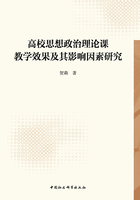本章小结
本章介绍了本书的主要研究目标,在第二章文献综述和理论分析的基础上,构建了一个高校思想政治理论课教学效果构成要素、影响因素的研究模型。在完成对研究模型构建的基础上,对数据获取方法、测量工具、样本特征、模型检验方法进行了基本介绍。采用研究所设计的测量工具和问卷进行调查,收集研究所需要的相关数据。在对数据进行初步处理的过程中,完成对问卷题项的筛选,形成信效度均达标的“高校思想政治理论课教学效果测量量表”“高校思想政治理论课课程难度测量量表” “高校思想政治理论课教师素质测量量表”“高校思想政治理论课教师教学组织测量量表”“高校思想政治理论课课堂环境测量量表”“学校教学组织与管理测量量表”。介绍了研究所采用的分析方法。采用描述性分析方法、t检验分析和方差分析方法对高校思想政治理论课教学效果的基本特征进行描述;进一步采用结构方程模型分析、回归分析、相关分析等方法,对本书所提出的高校思想政治理论课教学效果影响因素模型予以验证。
[1]张社强:《透视高校思想政治理论课教学满意度差异性》,《思想理论教育》2007年第6期。
[2]张社强:《广西高校思想政治理论课教学学生满意度研究》,硕士学位论文,广西大学,2008年,第4—17页。
[3]张耀灿、郑永廷、吴潜涛等:《现代思想政治教育学》,人民出版社2006年版,第286—293页。
[4]曾成平、熊明安:《略论教育价值》,《辽宁高等教育研究》1983年第4期。
[5]Marsh, Dunkin,“Students' Evaluations of University Teaching: A Multidimensional Perspective”, in Smart, ed., Higher Education: Handbook of Theory and Research, New York: Agathon, 1992, pp.143-233.
[6]沈壮海:《努力增强思想政治工作的实效性——学习邓小平、江泽民同志的有关论述》,《思想理论教育导刊》2001年第4期。
[7]文静:《高校思想政治理论课教师素质优化研究》,硕士学位论文,长安大学, 2008年,第55—67页。
[8]黄晓花:《高校思想政治理论课教师素质模型研究》,硕士学位论文,西南大学, 2011年。
[9]Creemers, Kyriakides, The Dynamics of Educational Effectiveness, London and New York:Routledge, 2008, pp.25-36.
[10]侯杰泰、温忠麟、成子娟:《结构方程模型及其应用》,教育科学出版社2004年版,第156页。
[11]Campbell, McIver,“Analyzing Models with Unobserved Variables: Analysis of Covariance Structures”, in Bohrnstedt, Borgotta, eds., Social Measurement: Current Issues, Beverley Hills:Sage, 1981, pp.65-115.
[12]Steiger,“When Constraints Evaluation and Modification: An Interval Estimation Approach”, Multivariate Behavioral Research, Vol.25, 1990, pp.173-180.
[13]邱皓政、林碧芳:《结构方程模型的原理与应用》,中国轻工业出版社2009年版,第69—89页。
[14]Cortina,“What is Coefficient Alpha? An Examination of Theory and Applications”, Journal of Applied Psychology, Vol.1, 1993, pp.98-104.
[15]DeVellis, R.,“Scale Development: Theory and Applications”, Applied Social Research Methods Series, Vol.26, 1991, pp.347-355.
[16]Kember, Biggs, Leung,“Examing the Multidimensionality of Approaches to Learning through the Development of a Revised Version of the Learning Process Questionnaire”, British Journal of Educational Psychology, Vol.74, 2004, pp.261-280.
[17]陆根书、程光旭、杨兆芳:《大学课堂学习环境论——课堂学习环境与大学生学习及发展关系的实证分析》,西安交通大学出版社2010年版,第51—68页。
[18]Boyer,“The Scholarship of Teaching from:Scholarship Reconsidered:Priorities of the Professoriate”, College Teaching, Vol.39, 1991, pp.11-13; Rice,“Toward a Broader Conception of Scholarship: The American Context”, Research and Higher Education: The United Kingdom and the United State, 1992, pp.117-129.
[19]李亮、朱庆华:《社会网络分析方法在合著分析中的实证研究》,《情报科学》2008年第4期;侯李萍:《增强高校思想政治理论课教学效果探究》,《学校党建与思想教育》2009年第1期;王微:《高校思想政治理论课教学效果的制约因素及其对策研究》,硕士学位论文,东北师范大学,2009年,第77—89页;肖海鹰、肖向梅、张保和:《高校思想政治理论课教学实效性浅析》,《教育与职业》2009年第32期;池文姬:《高职院校思想政治理论课教学效果研究》,硕士学位论文,延边大学,2010年,第59—67页;刘福洲:《也谈思想政治理论课教学效果的提高》,《思想理论教育导刊》2005年第10期。
[20]Darling-Hammond,“Teacher Quality and Student Achievement: A Review of State Policy Evidence”, Education Policy Analysis Archives, Vol.1, 2000; Douglas, Tim,“Teacher Training, Teacher Quality and Student Achievement”, Journal of Public Economics, Vol.95, 2011.
[21]袁立新、王小棉:《高师学生教学态度研究》,《心理发展与教育》2000年第4期。
[22]冯哲:《地理教学中小组讨论的组织策略与学习效果的实证研究》,硕士学位论文,首都师范大学,2011年,第2—18页。
[23]Cohen,“A Critical Analysis and Reanalysis of the Multisession Validity Meta-Analysis”, Annual Meeting of the American Educational Research Association, Washington DC, 1987.
[24]Feldman,“The Association between Student Ratings of Specific Instructional Dimensions and Student Achievement: Refining and Extending the Synthesis of Data from Multisession Validity Study”, Research in Higher Education, Vol.6, 1989, pp.583-645.
[25]Marsh, Dunkin,“Students' Evaluations of University Teaching: A Multidimensional Perspective”, in Smart, ed., Higher Education: Handbook of Theory and Research, New York: Agathon, 1992, pp.143-233.
[26]刘郁、孟庆茂:《高校教师教学效果的多因素模型的验证性分析》,《教育文化论坛》2009年第1期。
[27]孟庆茂、刘红云:《大学教师教学效果评价维度结构及影响因素研究》,《心理科学》2003年第4期。
[28]Rosenshine, Stevens, “Teaching Function”, in Wittrock, M.C., ed., Handbook of Research on Teaching, New York: Russell Sage, 1986, pp.376-391.
[29]Bush, Kennedy, Cruickshank,“An Empirical Investigation of Teacher Clarity”, Journal of Teacher Education, Vol.28, 1977, pp.53-58.
[30]夏侯畀春:《高中语文课堂讨论有效性策略的探究》,硕士学位论文,华东师范大学,2009年,第5—11页。
[31]杨业华:《思想政治教育环境需要深化研究的若干理论问题》,《马克思主义研究》2010年第6期。
[32]鄢进波:《高校本科生课堂环境问题研究——以上海地区高校为例》,硕士学位论文,上海师范大学,2011年,第20—35页。
[33]沈壮海:《论思想政治教育过程的内在构成》,《中国青年政治学院学报》2001年第1期。
